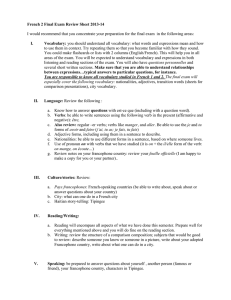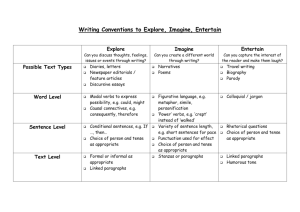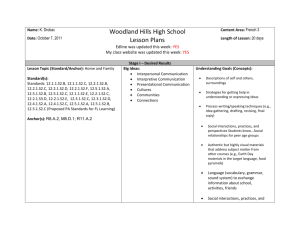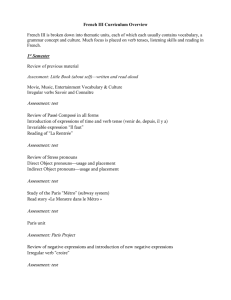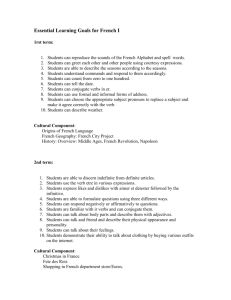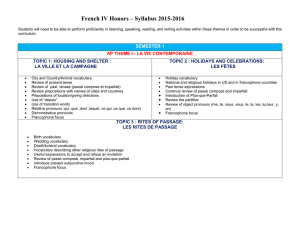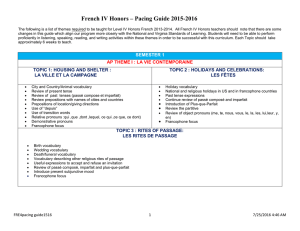French 1020 and 2030
advertisement
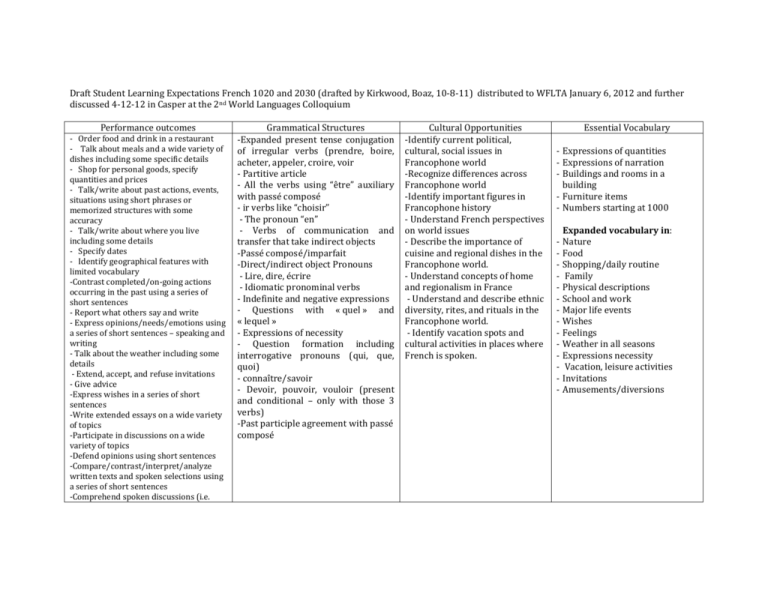
Draft Student Learning Expectations French 1020 and 2030 (drafted by Kirkwood, Boaz, 10-8-11) distributed to WFLTA January 6, 2012 and further discussed 4-12-12 in Casper at the 2nd World Languages Colloquium Performance outcomes - Order food and drink in a restaurant - Talk about meals and a wide variety of dishes including some specific details - Shop for personal goods, specify quantities and prices - Talk/write about past actions, events, situations using short phrases or memorized structures with some accuracy - Talk/write about where you live including some details - Specify dates - Identify geographical features with limited vocabulary -Contrast completed/on-going actions occurring in the past using a series of short sentences - Report what others say and write - Express opinions/needs/emotions using a series of short sentences – speaking and writing - Talk about the weather including some details - Extend, accept, and refuse invitations - Give advice -Express wishes in a series of short sentences -Write extended essays on a wide variety of topics -Participate in discussions on a wide variety of topics -Defend opinions using short sentences -Compare/contrast/interpret/analyze written texts and spoken selections using a series of short sentences -Comprehend spoken discussions (i.e. Grammatical Structures -Expanded present tense conjugation of irregular verbs (prendre, boire, acheter, appeler, croire, voir - Partitive article - All the verbs using “être” auxiliary with passé composé - ir verbs like “choisir” - The pronoun “en” - Verbs of communication and transfer that take indirect objects -Passé composé/imparfait -Direct/indirect object Pronouns - Lire, dire, écrire - Idiomatic pronominal verbs - Indefinite and negative expressions - Questions with « quel » and « lequel » - Expressions of necessity - Question formation including interrogative pronouns (qui, que, quoi) - connaître/savoir - Devoir, pouvoir, vouloir (present and conditional – only with those 3 verbs) -Past participle agreement with passé composé Cultural Opportunities -Identify current political, cultural, social issues in Francophone world -Recognize differences across Francophone world -Identify important figures in Francophone history - Understand French perspectives on world issues - Describe the importance of cuisine and regional dishes in the Francophone world. - Understand concepts of home and regionalism in France - Understand and describe ethnic diversity, rites, and rituals in the Francophone world. - Identify vacation spots and cultural activities in places where French is spoken. Essential Vocabulary - Expressions of quantities - Expressions of narration - Buildings and rooms in a building - Furniture items - Numbers starting at 1000 Expanded vocabulary in: - Nature - Food - Shopping/daily routine - Family - Physical descriptions - School and work - Major life events - Wishes - Feelings - Weather in all seasons - Expressions necessity - Vacation, leisure activities - Invitations - Amusements/diversions radio programs, announcements, opinion polls, interviews) French 2030: -Adverbial pronouns -Future tense -Future perfect tense -Conditional tense -Conditional past tense -Pluperfect tense -“If” and “when” clauses -Relative pronouns and agreement in compound tenses -Subjunctive French 2030: - Additional idiomatic expressions -Irregular adjectives -Subjuntive-requiring expressions/conjunctions -Expressions of opinion, volition, necessity, uncertainty -Indicators of future or hypothetical action -Additional negatives
